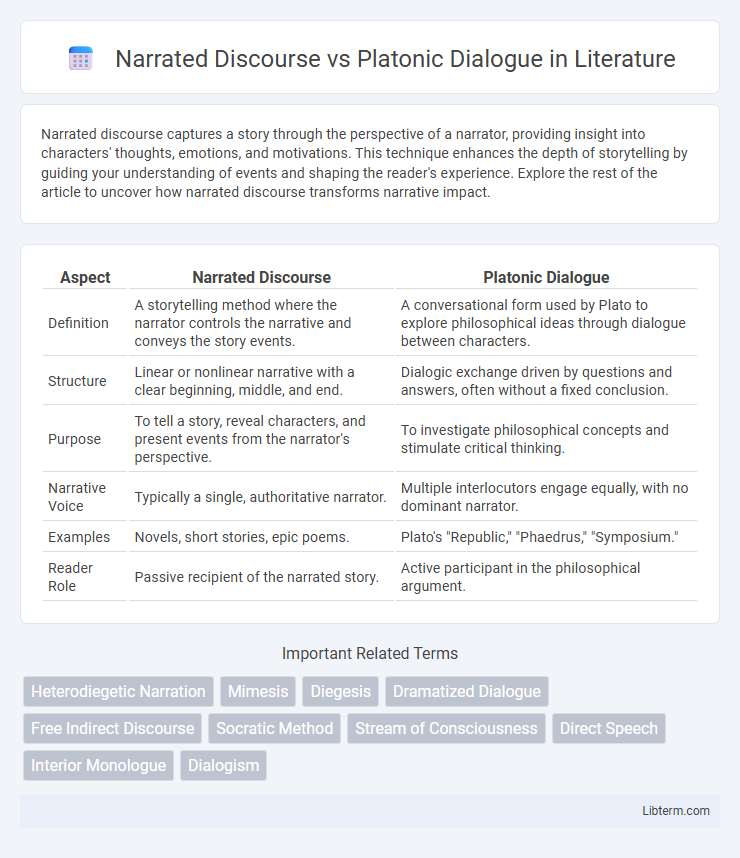Narrated discourse captures a story through the perspective of a narrator, providing insight into characters' thoughts, emotions, and motivations. This technique enhances the depth of storytelling by guiding your understanding of events and shaping the reader's experience. Explore the rest of the article to uncover how narrated discourse transforms narrative impact.
Table of Comparison
| Aspect | Narrated Discourse | Platonic Dialogue |
|---|---|---|
| Definition | A storytelling method where the narrator controls the narrative and conveys the story events. | A conversational form used by Plato to explore philosophical ideas through dialogue between characters. |
| Structure | Linear or nonlinear narrative with a clear beginning, middle, and end. | Dialogic exchange driven by questions and answers, often without a fixed conclusion. |
| Purpose | To tell a story, reveal characters, and present events from the narrator's perspective. | To investigate philosophical concepts and stimulate critical thinking. |
| Narrative Voice | Typically a single, authoritative narrator. | Multiple interlocutors engage equally, with no dominant narrator. |
| Examples | Novels, short stories, epic poems. | Plato's "Republic," "Phaedrus," "Symposium." |
| Reader Role | Passive recipient of the narrated story. | Active participant in the philosophical argument. |
Introduction to Narrated Discourse and Platonic Dialogue
Narrated discourse involves a storyteller presenting events with a clear narrative voice, guiding the audience through a structured plot and character perspectives, often emphasizing emotional and chronological coherence. Platonic dialogue, by contrast, employs a conversational format where philosophical ideas are explored through dialectical exchange, highlighting critical reasoning and the pursuit of truth without a single controlling narrator. Understanding these distinctions is crucial for analyzing how meaning and knowledge are constructed in literary and philosophical texts.
Defining Narrated Discourse: Key Features
Narrated discourse is characterized by a structured storytelling format where a narrator conveys events, thoughts, and emotions from a specific point of view, often incorporating descriptive language and temporal markers to guide the audience through the narrative. Key features include a clear narrative voice, cohesive temporal sequencing, and the use of narrative techniques such as flashbacks, inner monologues, and focalization to deepen the reader's connection with characters and plot development. Unlike Platonic dialogue's dialogic exchange aimed at philosophical inquiry, narrated discourse emphasizes immersive storytelling and character-driven perspective.
Characteristics of Platonic Dialogue
Platonic Dialogue features a structured conversational format where characters engage in philosophical inquiry through questions and answers, fostering critical thinking and dialectical reasoning. The dialogues emphasize the pursuit of truth and moral understanding by exposing contradictions and refining definitions rather than presenting a fixed narrative. Socratic questioning serves as a key method, encouraging participants to examine beliefs and achieve greater clarity in ethical and metaphysical concepts.
Historical Origins and Philosophical Context
Narrated discourse, rooted in ancient storytelling traditions, emerged as a method to convey events through a narrator's perspective, often blending history and myth, as seen in Homeric epics. Platonic dialogue, developed by Plato in classical Greece, is a dialectical form designed to explore philosophical ideas through conversational exchanges between characters representing differing viewpoints. This form reflects Socratic methods emphasizing critical inquiry and the search for truth within the context of early Western philosophy.
Narrative Voice vs Dialogic Exchange
Narrated discourse employs a singular narrative voice that guides the reader through the story with a consistent perspective, often revealing inner thoughts and thematic elements. In contrast, Platonic dialogue relies on a dialogic exchange between distinct characters, emphasizing the interaction of ideas through spoken conversation without a dominating narrative presence. This differentiation highlights how narrative voice serves as a unifying force in narrated discourse, whereas dialogic exchange foregrounds multiple viewpoints in Platonic dialogue.
Functions in Literature and Philosophy
Narrated discourse serves to convey a cohesive story with a definitive narrator guiding the reader's perception, often used in literature to build plot and character development through a structured narrative voice. Platonic dialogue operates as a dialectical tool in philosophy, employing conversational exchanges between characters to explore abstract ideas, stimulate critical thinking, and reveal philosophical truths. Functions of narrated discourse emphasize storytelling and emotional engagement, while Platonic dialogue focuses on intellectual inquiry and conceptual clarity.
Advantages and Limitations of Each Form
Narrated discourse offers clear advantages in controlling the narrative flow and providing comprehensive context, but it limits direct character interaction and dynamic engagement. Platonic dialogue excels in presenting philosophical ideas through interactive debate, fostering critical thinking and multiple perspectives, yet it can become overly abstract and less accessible to general audiences. Balancing these forms depends on the goal: narrations suit detailed storytelling, while dialogues are ideal for exploring complex concepts through conversational exchange.
Interpretive Challenges and Reader Engagement
Narrated discourse often presents interpretive challenges by filtering characters' thoughts and events through a narrator's perspective, which can create ambiguity about reliability and intent. Platonic dialogues engage readers directly through dynamic, philosophical exchanges that encourage active interpretation and critical thinking. This immediate interaction enhances reader engagement by inviting them to navigate multiple viewpoints without an authoritative intermediary.
Modern Adaptations and Influences
Modern adaptations of narrated discourse emphasize immersive, character-driven storytelling, often utilizing first-person perspectives and unreliable narrators to deepen psychological engagement. Platonic dialogue influences contemporary philosophical and literary works by preserving dialectical methods that explore ethical principles through structured conversational exchanges. Both forms continue to shape narrative techniques in digital media, interactive fiction, and educational frameworks by fostering critical thinking and complex narrative layering.
Conclusion: Choosing Between Narration and Dialogue
Choosing between narrated discourse and Platonic dialogue depends on the desired level of immersion and reader engagement. Narrated discourse offers a structured, comprehensive overview ideal for clarifying complex information, while Platonic dialogue encourages critical thinking through interactive, character-driven exchanges. Writers seeking to stimulate active interpretation should opt for dialogue, whereas those aiming for clear exposition and direct communication may prefer narrated discourse.
Narrated Discourse Infographic

 libterm.com
libterm.com